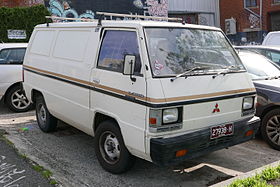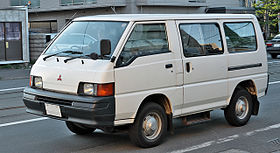Mitsubishi Delica
| Mitsubishi Delica | |
|---|---|
 |
|
| Overview | |
| Manufacturer | Mitsubishi Motors |
| Production | 1968–present |
| Assembly | Nagoya Plant, Okazaki, Aichi, Japan |
| Body and chassis | |
| Body style | Van Truck |
| First generation | |
|---|---|
 |
|
| Overview | |
| Also called | Mitsubishi Colt T100/T120 |
| Production | 1968–1979 |
| Assembly | Japan: Nagoya (Nagoya Plant) Indonesia: Jakarta (Pt.KTB Motors) |
| Body and chassis | |
| Body style | 3-door van 2-door pickup |
| Powertrain | |
| Engine | |
| Dimensions | |
| Wheelbase |
|
| Second generation | |
|---|---|

1984–1985 Mitsubishi L300 Express (SD) van (Australia)
|
|
| Overview | |
| Also called | Chrysler L300 Express (Australia) Ford Husky (South Africa) Mitsubishi Colt Solar/L300 (Indonesia) Mitsubishi L300 Mitsubishi L300 Express (Australia) Hyundai Porter Isuzu Bison (Indonesia) Mahindra Voyager (India) |
| Production | 1979–1986 (Van) 1979–1994 (Truck) 1981–present (Indonesia) 1987–present (Philippines) |
| Assembly | Japan: Nagoya (Nagoya Plant) Indonesia: Jakarta (Pt.KTB Motors) South Korea: Ulsan (Hyundai) Philippines: Santa Rosa, Laguna (Misubishi Philippines) |
| Body and chassis | |
| Body style | 2-door pickup 4-door van/wagon |
| Layout |
front engine, rear-wheel-drive front engine, four-wheel-drive |
| Powertrain | |
| Engine | 1.4 L I4 (gasoline) 1.6 L I4 (gasoline) 1.8 L I4 (gasoline) 2.0 L I4 (gasoline) 2.3 L I4 (diesel) 2.5 L I4 (diesel) |
| Transmission | 3-speed automatic 4-speed manual 5-speed manual |
| Dimensions | |
| Wheelbase | SWB: 2,200 mm (86.6 in) LWB: 2,350 mm (92.5 in) |
| Length | SWB: 4,100 mm (161.4 in) LWB: 4,260 mm (167.7 in) Van: 4,445 mm (175.0 in) |
| Width | 1,670–1,690 mm (65.7–66.5 in) (van) 1,695 mm (66.7 in) (pickup) |
| Height | 1,970–1,990 mm (77.6–78.3 in) (van) 1,795 mm (70.7 in) (pickup) |
| Third generation | |
|---|---|
 |
|
| Overview | |
| Also called | Mitsubishi L300 Mitsubishi Express (Australia) Mitsubishi Starwagon (Australia) Mitsubishi Versa Van Mitsubishi Van/Wagon (US) Dodge 1000 (Mexico) Hyundai Grace Hyundai H-100 |
| Production | 1986–1994 1994–2013 (extended production) |
| Assembly | Japan: Nagoya (Nagoya Plant) Indonesia: Jakarta () South Korea: Ulsan Taiwan (CMC) Venezuela: Caracas |
| Body and chassis | |
| Body style | 2-door pickup 4-door van |
| Layout | Mid engine, rear-/four-wheel drive |
| Platform | P01V–P35W |
| Powertrain | |
| Engine | 1,439 cc 4G33 I4 (gasoline) 1,597 cc 4G32 I4 (gasoline, P02/12) 1,795 cc 4G62 I4 (gasoline) 1,997 cc 4G63 I4 (gasoline) 2,351 cc 4G64 I4 (gasoline, P24) 2,476 cc 4D56 I4 (diesel) 2,476 cc 4D56 I4 (t/c diesel) 2,607cc D4BB I4 (diesel) |
| Transmission | 4-speed automatic 5-speed manual |
| Dimensions | |
| Wheelbase | 2,235–2,435 mm (88.0–95.9 in) |
| Length | 4,380–4,780 mm (172.4–188.2 in) |
| Width | 1,690 mm (66.5 in) |
| Height | 1,840–1,955 mm (72.4–77.0 in) |
| Fourth generation | |
|---|---|
 |
|
| Overview | |
| Also called | Mitsubishi L400 Mitsubishi Space Gear Mitsubishi Starwagon (Australia) |
| Production | 1994–2007 |
| Assembly | Japan: Nagoya |
| Body and chassis | |
| Body style | 4-door van |
| Layout |
Front engine, rear-wheel-drive layout Front engine, all-wheel-drive |
| Powertrain | |
| Engine | 2.5 L 4D56 I4 (t/c diesel) 2.4 L 4G64 I4 (gasoline) 2.8 L 4M40 I4 (t/c diesel) 3.0 L 6G72 V6 (gasoline) |
| Transmission | 4-speed automatic 5-speed manual |
| Dimensions | |
| Wheelbase | 2,800–3,000 mm (110.2–118.1 in) |
| Length | 4,595–5,085 mm (180.9–200.2 in) |
| Width | 1,695 mm (66.7 in) |
| Height | 1,855–2,070 mm (73.0–81.5 in) |
| Curb weight | 1,690–2,170 kg (3,730–4,780 lb) |
| Fifth generation | |
|---|---|
 |
|
| Overview | |
| Production | 2007–present |
| Assembly | Japan: Nagoya (Nagoya Plant) |
| Body and chassis | |
| Layout |
Front-engine, front-wheel-drive Front-engine, all-wheel-drive |
| Platform | Mitsubishi GS platform |
| Powertrain | |
| Engine | 1,998 cc 4B11 I4 (gasoline) 2,359 cc 4B12 I4 (gasoline) 2,268 cc 4N14 I4 (diesel) |
| Transmission | CVT INVECS-III automatic |
| Dimensions | |
| Wheelbase | 2,850 mm (112.2 in) |
| Length | 4,729 mm (186.2 in) |
| Width | 1,796 mm (70.7 in) |
| Height | 1,871 mm (73.7 in) |
The Mitsubishi Delica is a range of trucks and multi-purpose vehicles (MPVs) built by Mitsubishi since 1968. It was originally based on a small pickup truck introduced the previous year, also called the Delica, its name a contraction of the English language phrase Delivery car. This truck, and a commercial van derived from it has received many names in export markets, being sold as the L300 (later L400) in Europe, Jamaica (discontinued after the third generation) and New Zealand, Express and Starwagon in Australia, and plain Mitsubishi Van and Wagon in the US. The passenger car versions were known as Delica Star Wagon from 1979 until the 1994 introduction of the Delica Space Gear, which became simply Space Gear in Europe at least. The most recent version (not available as a commercial vehicle) is called the Delica D:5. With the exception of the fourth generation, all five generations are still sold in various international markets.
In Japan, the Delica Cargo nameplate was used on badge-engineered Mazda Bongos between 1999 and 2010. Since 2011, the Delica D:2 name has been applied to a rebadged Suzuki Solio.
The production of the Delica light commercial cab-over pickup began in July 1968. It received the chassis code T100, in line with the recently (January 1968) introduced "T90" Canter. Using a KE44 1,088 cc engine producing 58 PS (43 kW), its maximum payload was 600 kg (1,323 lb) and had a top end speed of 115 km/h (71 mph). A year later, in line with consumer needs, a cargo van and a passenger van were added to the line-up. The passenger van, discontinued in 1976, was called the 'Delica Coach' and could seat nine people in three rows of seats. The engine was upgraded to 62 PS (46 kW) in 1969.
In March 1971 a slightly facelifted version, called the Delica 75, arrived. This (the T120) received a small grille rather than the naked metal front of the earliest Delicas, and a new 1.4-liter Neptune (4G41) engine rated at 64 kilowatts (86 hp) was added to the line-up. The smaller 1.1-liter engine may have remained available in a 600 kilograms (1,300 lb) version of the truck but if so, it soon vanished entirely.
...
Wikipedia
